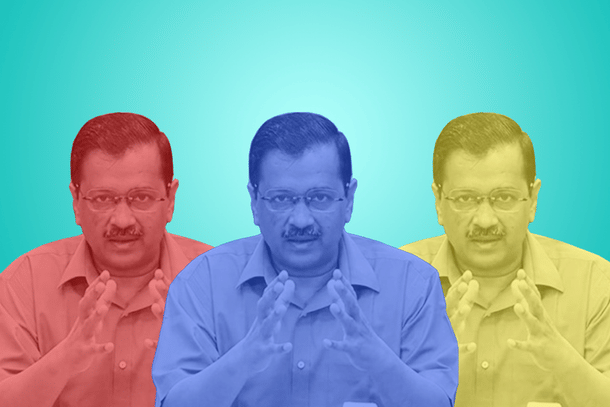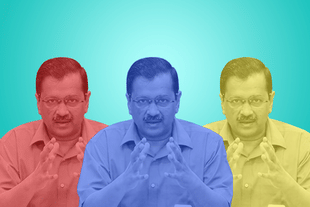Politics
The Mutant Meliorisms Of Mister Kejriwal
Venu Gopal Narayanan
May 31, 2021, 02:46 PM | Updated 05:48 PM IST
Save & read from anywhere!
Bookmark stories for easy access on any device or the Swarajya app.


As this piece goes to press, a devastating second wave of the Wuhan virus epidemic is finally on the wane in Delhi.
Daily case counts are down to just over a thousand. Active cases have dipped from about a lakh in early May, to below 15,000.
The test positivity ratio (TPR; daily cases by daily tests), which is a key indicator, and which had risen to a staggering 36 per cent in late April, is under two per cent now.
Last month’s terrible twin-crisis, of oxygen and ICU bed shortages, is also mercifully behind us, and lockdown restrictions stand to be eased from next week. The city is coming back to life.
Time then, for an in-depth assessment, of the way in which Delhi Chief Minister Arvind Kejriwal handled this fresh wave of the epidemic.
The easiest way to describe the Kejriwal model of epidemic management is to survey the man’s own public statements, in the first three weeks of April 2021, while cases in Delhi rose at an alarming pace, to alarming heights.
A chart below plots the Delhi Chief Minister’s various proclamations by date, on a red, TPR curve for his state through April:

At the start, Mister Kejriwal’s announcements were suffused with meliorism — a belief that the world can be made better by human effort. On 2 April, he committed himself publicly to arranging hospital beds, ventilators, and oxygen for the impending crisis, and told his flock not to worry.
According to him, this second national wave of the Wuhan virus, which was in fact the fourth in Delhi under his tenure, wasn’t serious.
On 11 April, he said that lockdowns weren’t a solution. This is at a time when the TPR had already crossed 10 per cent. And on 15 April, he made two emphatic declarations: one, that there was no shortage of hospital beds in Delhi; and two, very significantly, that the capital had adequate supplies of oxygen. Verbatim quote: ‘We are good on oxygen’. The TPR that day was at a startling 20 per cent.
Then came a string of statements so contradictory to what Kejriwal said earlier, that the sun nearly rose from the west. On 11 April, he backtracked on his 2 April line, and declared that this new epidemic wave was, in fact, extremely serious.
On 17 April, just two days after he said that there was no shortage of beds, Kejriwal complained that they were now short of beds. The day’s TPR stood at 24 per cent.
The next day, when the TPR surged to 29 per cent, and barely 72 hours after his authoritative ‘good-on-oxygen’ statement, Kejriwal abruptly announced that there was a shortage of oxygen in Delhi.
They were also out of intensive care beds, he said.
By the time Kejriwal mercifully stopped contradicting himself, the test positivity in Delhi was at a chilling 36 per cent, his health department had folded at the knees, and hundreds of the capital’s residents were dying every day under his watch.
Kejriwal’s good intentions had swiftly turned to catastrophic mismanagement in a matter of days. This sort of macabre, galloping meliorism raises important questions: what sort of person would contradict himself so many times, in such a short span of time, on so many crucial matters, with such devastating impact, on so many people?
Indians would do well to find out:
In his remarkable book, On the psychology of military incompetence, Norman Dixon discusses various personality traits which should be identified in advance, in individuals, so that they do not get promoted to senior command posts.
These include a boulder-sized chip on the shoulder, and a paranoid fear of failure, which makes them fawn to superiors while being uncaring to inferiors. It’s a trademark of those who somehow breach their ‘Peter’s Plateau’; the unctuously-deferential manner in which they interact with Prime Minister Modi, for example, while snarling gracelessly at those who sit below them on the pecking order.
Such a man, as per Dixon, lacks moral courage, ignores people and facts which do not conform to his world view, learns little from experience, and clings to what he thinks is right, even when the situation demands alternative approaches.
Consequently, this neural architecture forces such sorts to sit zombie-like, until disaster overwhelms them (in this case, the second wave, and its myriad, attendant crises).
The problem, in practical terms, is that even noble meliorism mutates when it comes in contact with the harsh realities of governance, the perplexities of decision-making, and the constant need to somehow hold on to a wayward mandate.
In political terms, this is when the revolution runs out of steam. In managerial terms, it means that both crisis and ego have the same start and end points.
Is such a person suitable for a leadership role? Simple answer: no.
Unfortunately, parliamentary democracies with a first-past-the-post system, by the very nature of their structure and function, are about as capable of screening out unsuitable types, as Mister Kejriwal is, of managing a crisis.
This inability gets accentuated when the true will of the people — individuals with the ability to identify and reject the wrong sort — is negated by vote banking.
That dissonance causes friction; and such friction causes political heat.
One might even devise a theorem, called Swarajya’s first law of thermo-politics: the probability of unsuitable candidates being elected to high office is directly proportional to the degree of identity politics orchestrated by them.
In painful corollary, Swarajya’s second law of electoro-dynamics would then state that: the duration a populace is forced to endure such regimes is the cube root of the rate of their enlightenment, multiplied by the sum of their woes.
Think about it: over 13,000 Delhiites have succumbed to the Wuhan virus in the past two months, and many hundreds of thousands of families were unnecessarily subjected to severe, traumatic deprivations, because of an ungodly mess created by political incompetence of benthic proportions.
As early as 2 April, Kejriwal made a public commitment that he would organise the requisite hospital beds and medical oxygen for Delhi, meaning that he was aware of the impending storm, and openly accepted his official responsibility.
As late as 15 April, when case counts were surging, he once again confidently reconfirmed his view in public, that there was no shortage of either oxygen or beds.

Everyone believed him on the point of material availability, not just because he was the man on the spot, but because, in the Indian set up, a Chief Minister’s statement is his formal assessment of a situation, arrived at after due internal deliberation and departmental review (It is another matter that Delhi was already reporting over 17,000 cases a day then, plus a 100 deaths a day, and the numbers were climbing fast).
From there, to resignedly throwing his hands up barely three days later, scowling to the camera, and sulkily complaining that the state he ran was now suddenly out of medical oxygen and hospital beds, underscores Dixon’s thesis of the ‘zombie-state’, and represents a fall from a towering summit into an abysmal trench.
But it’s not just Dixon. Carl von Clausewitz said it better two centuries earlier: ‘… there is nothing more common than to hear of men losing their energy on being raised to a higher position, to which they do not feel themselves equal …’
Or, sample Erik Erikson, the legendary psychologist who coined the term ‘identity crisis’: ‘Competence, then, is the free exercise of dexterity and intelligence in the completion of tasks, unimpaired by infantile inferiority’.
The point is that as we enter more firmly into a digital age of rising prosperity, in which aspirations and acceptable standards of governance rise too high to fail, it becomes that much more important for us to accurately profile the neural makeup of those who seek to lead us.
The more the media machine concocts a public persona, the more it needs to be dissected scientifically, lest we let loose upon ourselves an attractively-packaged, but dangerous jumble of inadequacies and inferiorities, prone under pressure to causing a stupefaction of leadership.
Ashis Nandy tried a jejune sort of pop-analysis on Modi once, some decades ago. It got Nandy his 15 minutes of fame, but he got his subject wrong because he applied inductive reasoning.
The current generation of commentators can do better, and must, if the wheat is to be sifted from the chaff amidst a blinding media glare.
In spite of this, the irony is that Kejriwal may yet survive politically, because that is what it boils down to in our current state of affairs: as long as a hefty ad-spend successfully deflects criticism, keeps the flak off the tube, and trounces accountability, incompetence can only be removed by the vote.
Have readers noticed how the frequency of Delhi government advertisements, featuring its benevolent Chief Minister, rose in tandem with cases in the state last month?
It’s the way things are; no inquiry committee will ever dislodge such a constitutional entity. Neither will agonizing, heartfelt bleating in cyberspace. The institutionalization of administrative sloth has inured us too much to public deficiencies, for either to work.
Also, as long as accountability is subverted by the moral equivalences crafted by a bent press, and crucial, periodic, revitalisation of political leadership is stymied by electoral engineering of social blocs, our two laws of political dynamics will remain valid, with people having to suffer more bumptious blunderings, more brazen shamelessness, and sadly, more public misery.
Still, in conclusion, a media creation like Kejriwal should know that perpetual smugness is a counterproductive chimera, especially when his mutant meliorisms have brought such devastation upon Delhi.
He and we should both learn that the realities are too local this time, and have probably hit too close to home, for PR largesse to work its usual magic; and finally, that, as with all veneers, the sheen always fades after a while.
The question is: at what further human cost will that learning come, and can we afford it?
(All data from Covid19india.org)
Venu Gopal Narayanan is an independent upstream petroleum consultant who focuses on energy, geopolitics, current affairs and electoral arithmetic. He tweets at @ideorogue.





